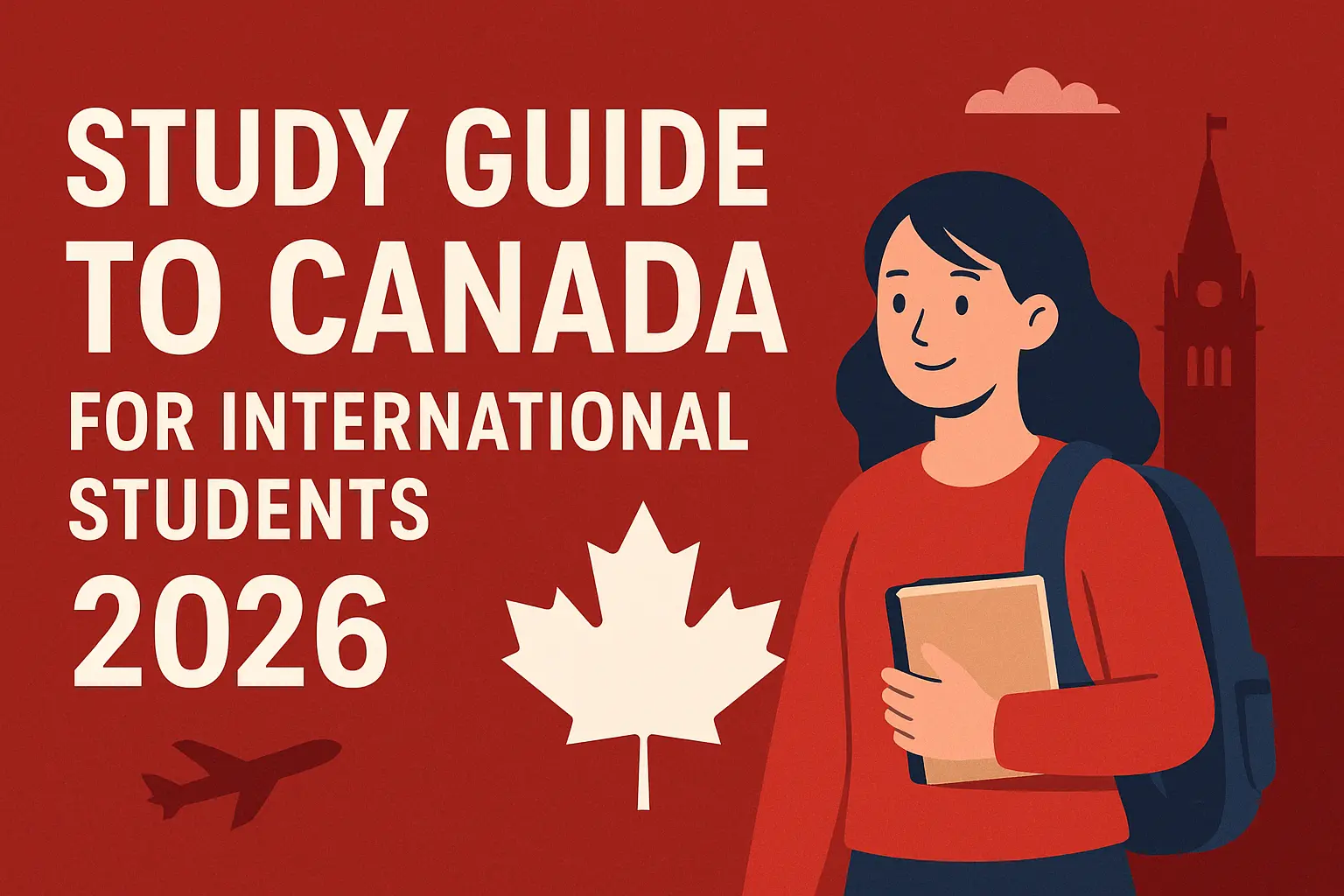Study Guide to Canada for International Students 2026
Every year, thousands of foreign students decide to study in Canada. These pupils are mostly Indian. Canada is one of the most popular places in the world to study because of its robust economy, top-notch colleges, and plenty of employment prospects. The Canadian federal government has issued some new directives that are directly relevant to foreign students who will be studying in Canada starting in 2026.
The best reasons to pursue higher education in Canada include its established economy, well regarded universities, and employment prospects for foreign nationals. With 427,000 Indian students enrolled, Canada, the second-largest nation in the world, is the most popular study destination. According to government estimates, foreign students contribute around $15.3 billion to the Canadian economy each year.
Canada is made up of ten provinces and three territories, with Ottawa serving as the country’s capital. This information illustrates how appealing Canada is as a place to study. To enroll in courses provided by Canadian institutions, students must meet eligibility requirements. All Indian students who wish to learn more about studying in Canada will find this thorough guide post useful.
Indian Students’ Study Guide to Canada
Indians have always favored studying in Canada. Canada is well-liked by Indian students who choose to study overseas because of its well-regarded educational system, prestigious colleges, diverse society, and strong employment market following higher education. The next step is to apply for admission to a Canadian university after deciding on a study program. You can apply for a study visa for Canada as soon as you obtain an admissions letter. First, let’s examine the advantages of attending Canadian institutions.
Why Come to Canada to Study?
When choosing between Canada and India, students need strong arguments for their choice. The following arguments might persuade you to decide to study abroad in Canada:
- Possibility of Attending Top institutions: According to the QS World University Rankings 2026, the University of Toronto and McGill are two of the top Canadian institutions.
- Education with a Research Focus: Students’ work preparation is improved by concentrating on research and hands-on learning rather than only memorizing the lecture.
- Immigrant-Friendly Work Permit laws: The Canadian government has laws that are more advantageous for students who wish to work in Canada after completing their higher education. You must, however, possess the necessary abilities for the position.
- Globally Recognized Programs: MBA, MS, and MD programs are recognized all around the world. Anywhere in the globe, you may easily get employment.
The Canadian Educational System
The Canadian educational system will be discussed in this portion of the essay. Canada’s educational systems differ by province or territory. Most establishments provide instruction in both English and French, as long as there are enough pupils who speak the second language. Usually, students in grades 9 through 12 attend high school. at Québec, high school concludes at grade 11 and is followed by a program called CEGEP that gets students ready for college or a technical career.
Canada’s Top 10 Universities
Here is a list of Canada’s best institutions together with their QS WUR 2026 and THE World University Ranking 2026 rankings:
| University Name | QS World University Ranking 2026 | THE Ranking 2025 |
| McGill University | 27 | 45 |
| University of Toronto | 29 | 21 |
| University of British Columbia | 40 | 41 |
| University of Alberta | 94 | =116 |
| University of Waterloo | 119 | =163 |
| Western University | 151 | 201–250 |
| University of Montreal | 168 | =125 |
| McMaster University | 173 | =116 |
| University of Calgary | 211 | 201–250 |
| Queen’s University | 191 | 201-350 |
Canada’s weather
Depending on where you are in Canada, the weather might vary greatly. Canada spans five time zones and extends from the Pacific to the Atlantic Ocean.
| City | Winter Weather | Summer Weather | Temperature Range |
| Montreal | Cold and snowy with strong wind-chill; snowfall from November to March. | Warm and pleasant. | Winter: -6°C to -15°CSummer: 15°C to 25°C |
| Vancouver | Wet but mild; snow is rare, frequent rain. | Pleasantly warm and dry. | Winter: 3°C to 7°CSummer: ~22°C |
| Toronto | Cold and snowy, but milder than most Canadian cities. | Warm with comfortable temperatures. | Winter: -4°C to 12°CSummer: 15°C to 25°C |
Here is a table that shows Toronto City’s temperature range by month:
| Month | Average Temperature in Toronto (Canada) |
| January | -4°C to -6°C |
| February | -3°C to -5°C |
| March | 0°C to 4°C |
| April | 5°C to 12°C |
| May | 10°C to 18°C |
| June | 15°C to 24°C |
| July | 18°C to 27°C |
| August | 17°C to 26°C |
| September | 13°C to 22°C |
| October | 7°C to 14°C |
| November | 2°C to 8°C |
| December | -2°C to 2°C |
Language Issues in Canada
It might be difficult at first to live in a culture where you must speak English or perhaps French on a daily basis. When you first come, you can run across the following linguistic issues:
| Aspect | Description |
| Understanding Local Accents | Regional accents in Canada vary widely, and you might not grasp them immediately. Allow yourself time to adjust and become familiar with the local way of speaking. |
| Learning Slangs | Canadians frequently use slang in everyday conversations. It may take a while to understand these expressions fully. |
| Humour or Fun | Humor is an essential part of Canadian communication. It’s meant to show friendliness, not disrespect—so take it in a light-hearted way. |
| Abbreviations Knowledge | Canadians often use abbreviations like TA (Teacher’s Assistant) or PoliSci (Political Science). If you’re unsure of a term, don’t hesitate to ask for clarification. |
Apartments in Canada
First, you must choose between living with a private landlord or in housing run by the university. A catered or self-catered alternative may also be available if you select housing supervised by the university. The advantages of having your meals prepared for you and some assurance regarding meal prices are provided by catered accommodations.
The accommodation office is a good place to start if you know what you desire. The university accommodation office can give you a list of nearby private houses and landlords if you are considering renting from a private landlord or if your preferred institution is unable to provide you with anything in its own residential facilities.
You should be aware of your contractual rights and obligations no matter where you decide to reside. You will often be required to sign a tenancy agreement, which you should carefully read. Take a look at some advice for locating student housing overseas.
Activities
Colleges and universities provide a variety of extracurricular activities that enhance your time as a student in addition to athletics. Students can express themselves creatively and engage in outside learning through participation in music, theater, and literary groups. The collegiate experience frequently includes trips to various theaters, concerts, museums, art galleries, places of worship, historical sites, and scientific establishments.
















Leave a Reply